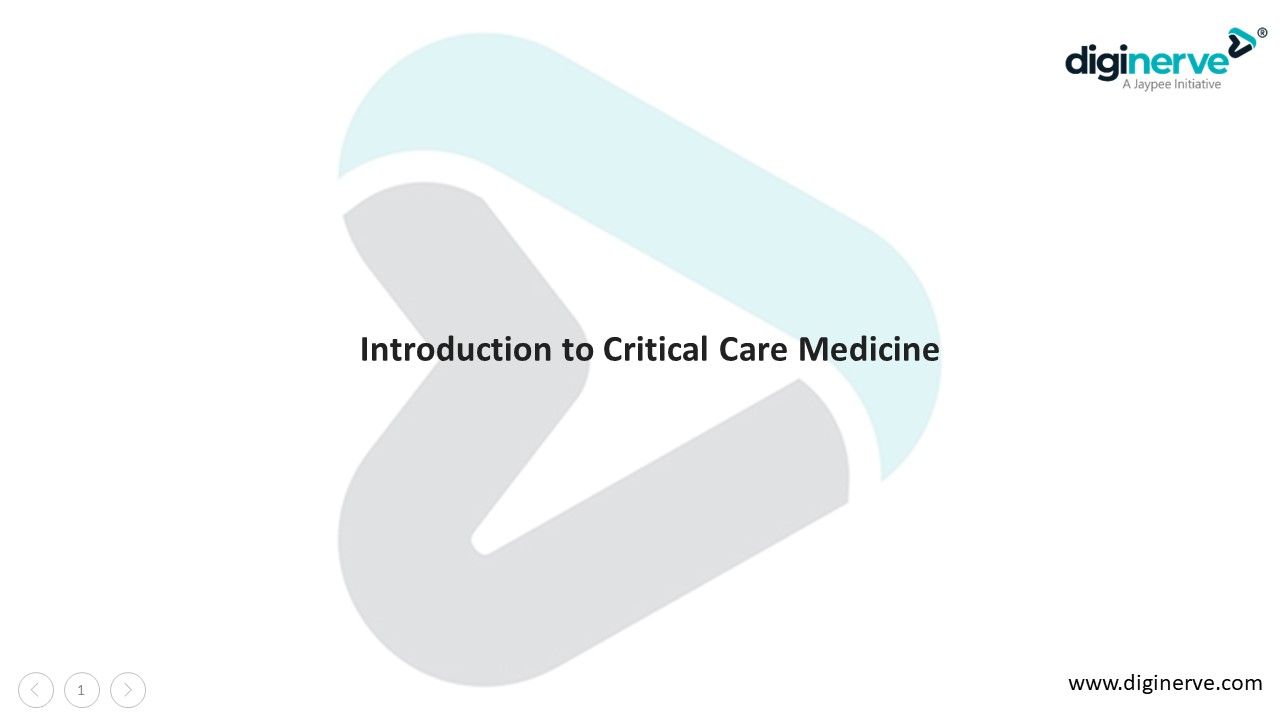Introduction to Critical Care Medicine - PowerPoint PPT Presentation
Title:
Introduction to Critical Care Medicine
Description:
Critical care medicine (CCM) is a specialised field of medicine that focuses on the diagnosis and management of critically ill patients. These patients are often those with life-threatening injuries or illnesses, and they require intensive monitoring and support in order to survive. – PowerPoint PPT presentation
Number of Views:2
Title: Introduction to Critical Care Medicine
1
Introduction to Critical Care Medicine
2
Critical Care Medicine (CCM) is a specialised
field of medicine that focuses on the diagnosis
and management of critically ill patients. These
patients are often those with life-threatening
injuries or illnesses, and they require intensive
monitoring and support in order to survive. Also
known as intensive care medicine, it is vital in
healthcare because it allows us to save lives and
improve the quality of life for many patients.
Critical care doctors and nurses are highly
trained to provide specialised care to these
patients, and they use a variety of advanced
medical technologies to do so.
3
These professionals usually treat a wide range of
conditions, including ? Heart
failure ? Stroke ? Renal
failure ? Respiratory failure ? Severe
infections ? Multiple organ
failure ? Trauma ? Burns ?
Poisoning ? Postoperative
complications
4
- Key Aspects of Critical Care Medicine
- Early diagnosis and intervention A patient's
prognosis is expected to be better treated the
earlier a serious illness is identified. Critical
care teams keep a careful eye on their patients
for this reason. - Multidisciplinary care To give their patients
all-encompassing treatment, critical care doctors
collaborate closely with other experts. By
working as a team, they may leverage the
knowledge of several fields to create the most
effective treatment strategy for every patient.
5
- Support of organ function Until the patient's
underlying ailment can be addressed, the aim of
critical care medicine is to support organ
function. This might entail the use of dialysis,
artificial ventilation, or other life-sustaining
techniques. - Complications avoidance Another goal of critical
care doctors is to keep their patients away from
experiencing complications. Prophylactic
treatments for deep vein thrombosis, pressure
ulcers, and ventilator-associated pneumonia may
be part of this.
6
- Care for patients and their families Critical
care Doctors are aware that patients and their
families experience stress during severe illness.
They strive to help patients and their families
along the critical illness journey and to include
them in the decision-making process. - The area of critical care medicine is demanding
yet satisfying.
7
Career Opportunities For many years there has
been a major requirement for the practitioners of
this field. After COVID, it had become quite
clear there is an urgent need for them. There
are numerous job opportunities related to this
field in India and worldwide. These jobs are
available in both public and private sectors in
several medical branches. These job profiles
associated with CCM are
8
- Intensive Care Specialist
- Critical Care Physician
- Critical Care Nurses
- Burn Specialists
- Pulmonologist
- Surgeons
9
- Lecturers
- Clinical Researchers
- The list goes on
- All of these job profiles are well-paying and
satisfactory.
10
- Skills Needed for Becoming a Critical Care
Specialist - Each specialised profession requires specific
skill sets. - In the case of CCM-related positions, the
requisite skills include - Monitoring It is essential to monitor patients.
This helps in gathering accurate data on heart
rate, fluid balance, etc., which is needed for
proper treatment.
11
- Technical Skills An intensive care medicine
professional is supposed to have some technical
understanding of all the medical equipment and
supplies. - Communication Skills Every medical professional
needs to have enough communication skills to
convey and counsel related to the health of
patients. Also, they have to be capable enough to
communicate with other medical professionals.
12
- Leadership Skill Just like any other field, this
skill is also important for this field. This will
help you manage your team well and encourage it
to do better. - Documentation It is important to document
everything related to medical procedures and
records. These can be used as future references.
13
Critical Care Simplified Course Now we have just
understood CCM. After that, the question arises
as to how to get proper education related to it.
The platform where you can obtain education and
guidance is Diginerve. A critical care
simplified course will be provided to you.
Endorsed by Sepsis Forum, it is created by three
well-known chief editors, namely Dr. Yatin Mehta,
Dr. Subhal Dixit, and Dr. Kapil G Zirpe. They
have done this in collaboration with 48 known
faculty of our country.
14
It provides one of the best e-learning for
critical care learners. It is designed to make
learners well-versed in all the major aspects and
skills related to intensive care medicine. This
online course integrates theoretical information,
case studies, and interactive learning exercises
in order to improve participants' abilities and
competencies in handling critically ill
patients. Throughout these critical care online
courses, they will get to explore a variety of
critical care themes, such as resuscitation,
trauma management, and sepsis management along
with the most recent developments in this medical
domain.
15
Through this online critical care education, they
will learn about the necessity of excellent
communication and teamwork within the
interdisciplinary critical care unit. In
this online critical care certification, we will
cover organ donation, anaesthesia sedatives, and
other specialty topics as well.
16
This best online critical care course includes ?
Video lectures that are based on evidence-based
studies. ? Detailed and informative digital
notes. ? Multiple-choice questions for
self-evaluation. ? Color-coded drug formulary
? Recent evidence-based recommendations ? Chat
shows with our course creators. To conclude, you
will earn course completion certificates (by
Sepsis Forum) after completing this online course
for critical care.
17
Lets Connect for More
Support care_at_diginerve.com Enquiries 91 8800
418 418 https//www.diginerve.com/
https//www.facebook.com/diginerve.jaypee/ http
s//www.instagram.com/diginerve.jaypee/ https//t
witter.com/diginerve































